List items
Items from the current list are shown below.
Blog
The central point Maciej makes is that websites have become script-ridden quagmires of bloat. Even viewing a single tweet will result in nearly a megabyte of download. He identifies a few reasons for this. First that ever increasing bandwidth and decreasing latency means web developers don't notice how horrifically obese their creations have become. While the problem is well-known with no end of articles discussing the issue and presenting approaches for fixing it, they invariably miss the point. They focus on complex, clever optimisations, rather than straightforward byte-count. Those that do consider byte-count can make things worse by shifting the goalposts upwards, inflating what can be considered 'normal'. Finally, the unsustainability of the Web economy has led to the scaffold of scripts used by advertisers and trackers to accelerate in complexity.
There are some sublime examples in the presentation, like the 400-word article complaining about bloat that itself manages to somehow accumulate 1.2 megabytes of fatty residue on its way through the interflume arteries. If you've not read it, go do so now and heed its message.
Like I said, the last thing I need is distractions right now, which is why the article immediately prompted me to check my own website's bandwidth stats. Having nodded along enthusiastically with everything written in Maciej's presentation, I could hardly just leave it there. I needed to apply the Russian Literature Test:
"text-based websites should not exceed in size the major works of Russian literature"
What I found was pretty embarrassing. The root page is one of the simplest on my site. Here's what it looks like:
Yet it weighed in at 800KB. That's the same size as a "the full text of The Master and Margarita" by Bulgakov. Where's all that bandwidth going? The backend of my site is like Frankenstein's monster: cobbled together from random bits of exhumed human corpse. Nonetheless it should make it relatively terse in its output and it certainly shouldn't need all that. Checking with Mozilla's developer tools, here's what I found.
There are some worrying things here. For some reason the server spent ages sitting on some of the CSS requests. More worrying yet is that the biggest single file is the widget script for AddThis. I've been using AddThis to add a 'share' button to my site. No-one ever uses it. The script for the button adds nearly a third of a megabyte to the size, and also gives AddThis the ability to track anyone visiting the site without their knowledge.
Not good; so I dug around on the Web and found an alternative called AddToAny. It doesn't use any scripts, just slurps the referrer URL if you happen to click on the link. This means it also doesn't track users unless they click on the link. Far preferable.
After making this simple change, the network stats now look a lot healthier.
Total bandwidth moved from 800KB to 341KB, cutting it by over a half (see the totals in the bottom right corners). It also reduced load time from 2s down to 1.5s.
But I wasn't done yet. I harbour a pathological distrust of Apple, Google, Facebook and Microsoft, and ditched my Google account over a year ago. I've always been sad about this because Google in particular makes some excellent products that I'd otherwise love to use. Google Fonts is a case in point, with its rich collection of high quality typefaces and a really easy API for using them on the web. Well look there in the downloads and you'll see my site pulls down 150KB of font data from Google. That's the Cabin font used on the site if you're interested.
Sadly then, in my zeal to minimise Google's ability to track me, I totally ignored the plight of those visiting my site. Every time the font is downloaded Google gets some juicy analytics for it to hoard and mine.
The solution I've chosen is to copy the fonts over to my own server (the fonts themselves are open source, so that's okay). Google's servers are considerably faster at responding than my shared-hosting server, but the change doesn't seem to impact the overall download time, and even reduces the overall size by 0.17KB (relative URLs are shorter!). Okay, that's not really a benefit, but the lack of tracking surely is.
The final result has increased page load and reduced bandwidth usage to less than Fyodor Dostoyevsky's The Gambler, which I think is fitting given Dostoyevsky was forced to keep it short, writing to a deadline to pay off his gambling debts. Russian Literature Test passed!
I feel chuffed that my diversionary tactics yielded positive results. All is not quite peachy in the orchard though. Many will argue that including a massive animated background on my page is hypocritical, and they're probably right. Although the shader's all of 2KB of source, it'll be executed 100 million times per second on a 4K monitor. Some of the pages also use Disqus for the comments. I've never really liked having to use Disqus, but I feel forced to include some kind of pretence at being social. Here's why it's a problem.
Not only does Disqus pull in hundreds of KB of extra data, it also provides another perfect Trojan horse for tracking. I've not yet found a decent solution to this, and I fear the Web is just too busy eating itself to allow for any kind of sensible fix.
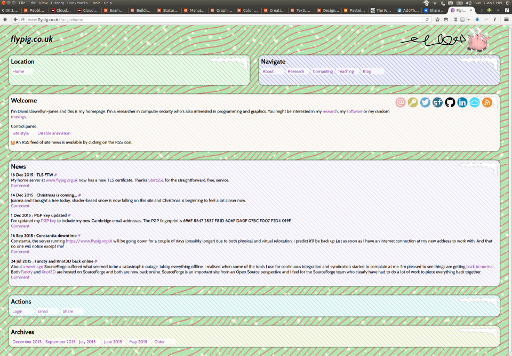
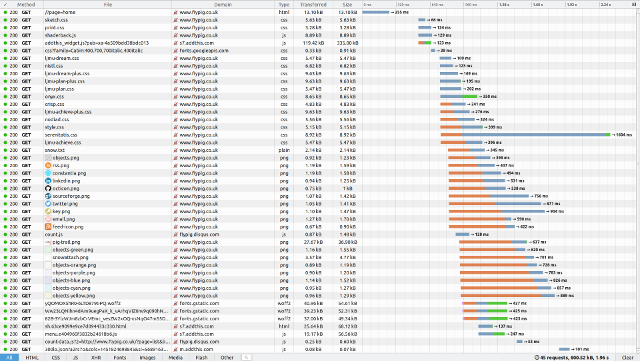
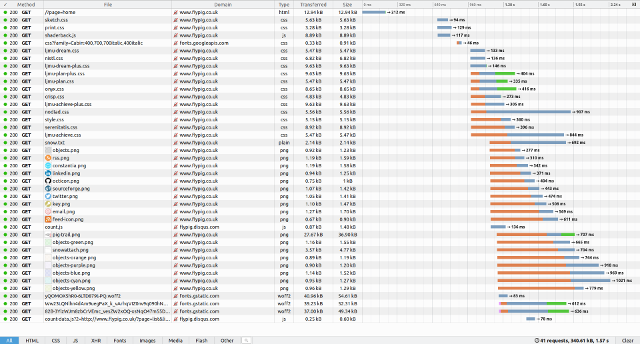
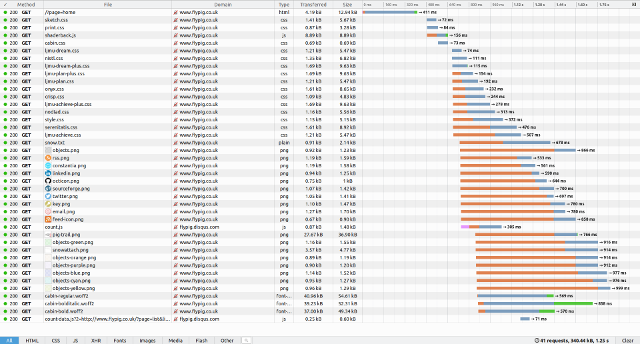
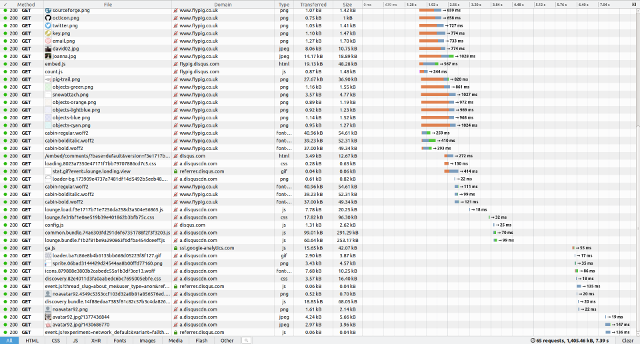
Comments
Uncover Disqus comments